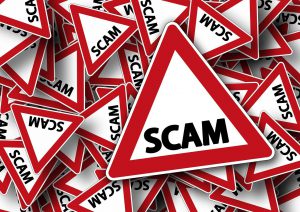As we head into late summer, and start dreaming of crisp fall weather and pumpkin spice, it’s worth remembering that summer hazards are still around us in full force. That includes things like the risks of heatstroke and sunburn, but also the chance that your area could be hit with a natural disaster like a major storm or wildfire. Natural disasters like these can not only cause damage and devastation to your property, but they could also wreak havoc on your access to utilities like electricity, gas, water, and phone lines – and, as if that weren’t bad enough, there are scammers out there impersonating utility company representatives who could try to take advantage of you when you are at your most vulnerable. Remember, though, while these scams increase following natural disasters that affect people’s power and water, they can happen at any time, so be ready by knowing how to identify scammers – and how to handle them!
The Scams
It’s depressing to think that there are people out there who will lie to make a quick buck, and especially depressing that they tend to do it to older people during difficult times, but it’s something you need to be aware of. Information from organizations like the Better Business Bureau (BBB), the Federal Trade Commission (FTC), and FEMA point to the fact that incidences of utility scams dramatically increase after natural disasters, and these organizations urge people (especially seniors) to know scammers’ tactics, what to do when confronted by a possible utility scammer, and the general do’s and don’ts of dealing with any sort of utility company issues. 
Emily Wu, an attorney for the FTC, gives an overview of what to look out for: “Scammers know severe weather may have shut off your electricity, heat, and water, and might pose as your utility company. They might call to say that they’re sorry your power went out and offer a reimbursement, but first they need your bank account information. They might email you to say that there’s an error in their system, and you have to give them personal information so they can turn your gas on again. They could even threaten to leave your utilities shut off if you don’t send them money immediately. But those are all lies.”
Let’s take a closer look at what you should be watching out for, and specifically how these scammers might try to contact you:
At Your Door

Scammers might go the old-fashioned route and come to your door, so be very suspicious of anyone who doesn’t have an appointment or who shows up if you haven’t contacted the utility company for assistance. They might ask for immediate payment, or even for access to your home so that they can try to steal items or your personal information; they might offer some of the following excuses for needing to come inside:
- They need to check, repair, replace, or reset something inside, like your water or natural gas pipes, electrical wiring, or appliances, and might use scare tactics to get access.
- They are offering a free service, like an energy “audit,” an “efficiency inspection,” or a water quality/pressure test.
- They claim there’s a major gas leak or other serious issue in the area and they need to check your home.
Again, whatever you do, do not let anyone in who you are not expecting – any legitimate utility workers or representatives will make an appointment in advance, or will at least provide you with proper ID when they speak with you.
On the Phone
Utility phone scams are another common problem, and usually involve scammers trying to get payment of some form or your personal financial information. They might:
- Demand immediate payment and threaten to disconnect your service if they don’t receive it, and they will often require that the payment be made in a specific way, like with a prepaid card. Utility companies will never require this type of payment, and will also send you one or more disconnection warnings first.
- Call asking for payment, and give you a phony account or routing number to use to pay your bills, and will ask that you give them your financial info.
- Tell you that you have “overpaid” on your last bill and have a reimbursement coming to you, but you need to give them your banking information so that they can deposit the funds.
- Offer you an “express service” after a natural disaster, so that your power/water/gas is restored more quickly – but only if you pay an upfront “reconnection fee.”
Via Technology
Scammers these days have more than just these traditional tactics to fall back on; they might also try to contact you via:
- Text message – Known as “smishing,” short for SMS phishing, scammers will send out texts that look like they’re from a utility company, and that ask for personal information that they can use for identity theft purposes. Your utility company will probably never ask for information this way, and will certainly never contact you via text message unless you’ve opted into that service. When in doubt, contact your utility company directly if you’ve received a text from them.

- Email – Utility scammers can easily obtain your email address and send messages about errors in their system, or other technical issues that they need your personal information to resolve. Some scammers will even cleverly create a “bill” from your utility company and send it to you via email; this bill will often direct you to a bogus website that will steal your personal information.
The Do’s and Don’ts
All of this might sound a bit overwhelming, and a lot to worry about, but don’t worry! There are some specific things you can do (and not do!) to avoid being taken for a ride by utility scammers. Here are your basic do’s and don’ts of dealing with utility companies or problems:
Do:
- Only use the phone number provided on your bill to contact your utility company if you are behind on a payment or have received a message from them. Never use a call back number from an unknown source, and always verify that every message comes from them.
- Know how your utility company deals with customers; for example, they will never ask for personal information over the phone, and they will not simply cut off your service without advance warning.
- Thoroughly question anyone that comes to your door or calls you and claims to be from your utility company – ask them for ID, their employee number, and for any specific information they can give you about your account.
- Notify your utility company if you suspect you’ve been contacted by a scammer.
- Tell your neighbors to be on the lookout if you suspect there’s a scammer making the rounds in your area.
Don’t:

- Provide personal or financial information to anyone who comes to your door, calls you, or emails you – ever!
- Use questionable payment methods to someone claiming to be with your utility company, including gift cards, cryptocurrency, prepaid cards, or wire transfer.
- Get scared or allow yourself to be bullied! Scammers will threaten to immediately cut off your service, but your utility company will always send you multiple notices, as well as a date when they might cut off your service if it comes to that.
- Let anyone into your home if you don’t have an appointment, haven’t requested help, or haven’t received advance notice from your utility company; even then, make sure to check their ID, and contact your utility company if you’re unsure.
- Click on any links sent to you via text message or email unless you’re 100% sure they are from your utility company.
There’s no doubt about it: it stinks that there are people who are slimy enough to prey on older adults – and it makes it especially heinous that they often do so during the worst of times, like after a natural disaster. But remember that utility scams can happen at any time, they just get more frequent after these events, so always remain vigilant, and follow the tips above to keep yourself out of trouble!
